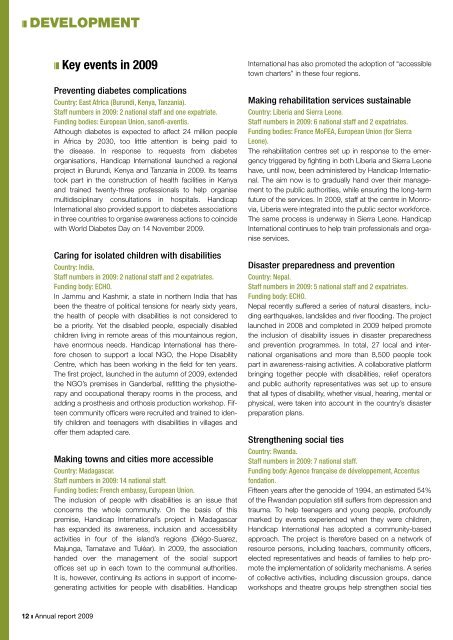Annual report 2009 - Handicap International
Annual report 2009 - Handicap International
Annual report 2009 - Handicap International
Create successful ePaper yourself
Turn your PDF publications into a flip-book with our unique Google optimized e-Paper software.
xz Developmentxz Key events in <strong>2009</strong>Preventing diabetes complicationsCountry: East Africa (Burundi, Kenya, Tanzania).Staff numbers in <strong>2009</strong>: 2 national staff and one expatriate.Funding bodies: European Union, sanofi-aventis.Although diabetes is expected to affect 24 million peoplein Africa by 2030, too little attention is being paid tothe disease. In response to requests from diabetesorganisations, <strong>Handicap</strong> <strong>International</strong> launched a regionalproject in Burundi, Kenya and Tanzania in <strong>2009</strong>. Its teamstook part in the construction of health facilities in Kenyaand trained twenty-three professionals to help organisemultidisciplinary consultations in hospitals. <strong>Handicap</strong><strong>International</strong> also provided support to diabetes associationsin three countries to organise awareness actions to coincidewith World Diabetes Day on 14 November <strong>2009</strong>.Caring for isolated children with disabilitiesCountry: India.Staff numbers in <strong>2009</strong>: 2 national staff and 2 expatriates.Funding body: ECHO.In Jammu and Kashmir, a state in northern India that hasbeen the theatre of political tensions for nearly sixty years,the health of people with disabilities is not considered tobe a priority. Yet the disabled people, especially disabledchildren living in remote areas of this mountainous region,have enormous needs. <strong>Handicap</strong> <strong>International</strong> has thereforechosen to support a local NGO, the Hope DisabilityCentre, which has been working in the field for ten years.The first project, launched in the autumn of <strong>2009</strong>, extendedthe NGO’s premises in Ganderbal, refitting the physiotherapyand occupational therapy rooms in the process, andadding a prosthesis and orthosis production workshop. Fifteencommunity officers were recruited and trained to identifychildren and teenagers with disabilities in villages andoffer them adapted care.Making towns and cities more accessibleCountry: Madagascar.Staff numbers in <strong>2009</strong>: 14 national staff.Funding bodies: French embassy, European Union.The inclusion of people with disabilities is an issue thatconcerns the whole community. On the basis of thispremise, <strong>Handicap</strong> <strong>International</strong>’s project in Madagascarhas expanded its awareness, inclusion and accessibilityactivities in four of the island’s regions (Diégo-Suarez,Majunga, Tamatave and Tuléar). In <strong>2009</strong>, the associationhanded over the management of the social supportoffices set up in each town to the communal authorities.It is, however, continuing its actions in support of incomegeneratingactivities for people with disabilities. <strong>Handicap</strong><strong>International</strong> has also promoted the adoption of “accessibletown charters” in these four regions.Making rehabilitation services sustainableCountry: Liberia and Sierra Leone.Staff numbers in <strong>2009</strong>: 6 national staff and 2 expatriates.Funding bodies: France MoFEA, European Union (for SierraLeone).The rehabilitation centres set up in response to the emergencytriggered by fighting in both Liberia and Sierra Leonehave, until now, been administered by <strong>Handicap</strong> <strong>International</strong>.The aim now is to gradually hand over their managementto the public authorities, while ensuring the long-termfuture of the services. In <strong>2009</strong>, staff at the centre in Monrovia,Liberia were integrated into the public sector workforce.The same process is underway in Sierra Leone. <strong>Handicap</strong><strong>International</strong> continues to help train professionals and organiseservices.Disaster preparedness and preventionCountry: Nepal.Staff numbers in <strong>2009</strong>: 5 national staff and 2 expatriates.Funding body: ECHO.Nepal recently suffered a series of natural disasters, includingearthquakes, landslides and river flooding. The projectlaunched in 2008 and completed in <strong>2009</strong> helped promotethe inclusion of disability issues in disaster preparednessand prevention programmes. In total, 27 local and internationalorganisations and more than 8,500 people tookpart in awareness-raising activities. A collaborative platformbringing together people with disabilities, relief operatorsand public authority representatives was set up to ensurethat all types of disability, whether visual, hearing, mental orphysical, were taken into account in the country’s disasterpreparation plans.Strengthening social tiesCountry: Rwanda.Staff numbers in <strong>2009</strong>: 7 national staff.Funding body: Agence française de développement, Accentusfondation.Fifteen years after the genocide of 1994, an estimated 54%of the Rwandan population still suffers from depression andtrauma. To help teenagers and young people, profoundlymarked by events experienced when they were children,<strong>Handicap</strong> <strong>International</strong> has adopted a community-basedapproach. The project is therefore based on a network ofresource persons, including teachers, community officers,elected representatives and heads of families to help promotethe implementation of solidarity mechanisms. A seriesof collective activities, including discussion groups, danceworkshops and theatre groups help strengthen social ties12 ı <strong>Annual</strong> <strong>report</strong> <strong>2009</strong>
















